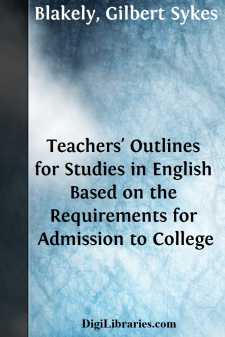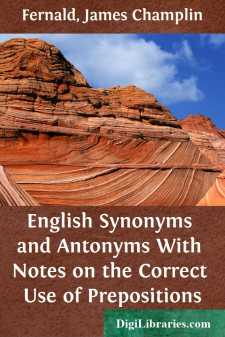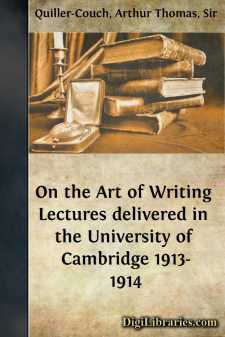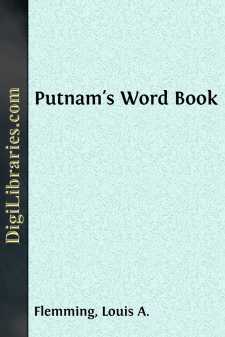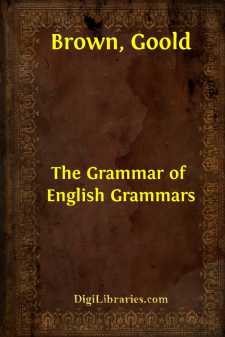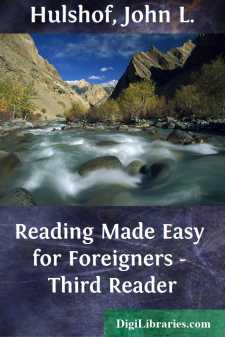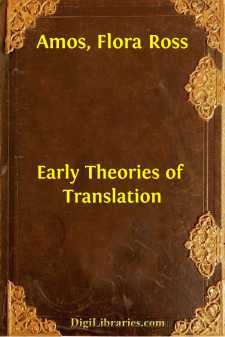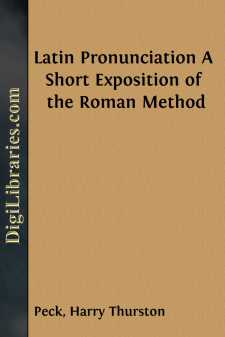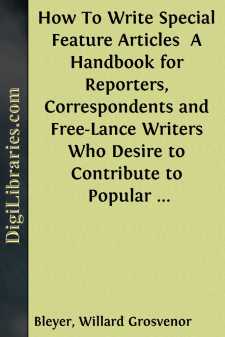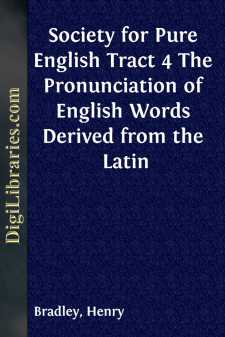Language Arts & Disciplines
Language Arts & Disciplines Books
Sort by:
I. THE TEACHING OF THE NOVEL All will agree that the novel is one of the most important forms of literature for high school study. The fact that almost every boy and girl who is at all interested in reading likes the novel, gives the teacher an excellent opportunity to stimulate the pupil's love for literature and to help him to discriminate between what is true and what is false; between what is...
more...
PREFACE. The English language is peculiarly rich in synonyms, as, with such a history, it could not fail to be. From the time of Julius Cæsar, Britons, Romans, Northmen, Saxons, Danes, and Normans fighting, fortifying, and settling upon the soil of England, with Scotch and Irish contending for mastery or existence across the mountain border and the Channel, and all fenced in together by the sea, could...
more...
LECTURE I. INAUGURAL Wednesday, January 29, 1913 In all the long quarrel set between philosophy and poetry I know of nothing finer, as of nothing more pathetically hopeless, than Plato's return upon himself in his last dialogue 'The Laws.' There are who find that dialogue (left unrevised) insufferably dull, as no doubt it is without form and garrulous. But I think they will read it with...
more...
Preface The purpose of this book, as conceived by the author, is not to attempt to create or to influence usage by pointing out which words should or should not be used, nor to explain the meaning of terms, but simply to provide in a form convenient for reference and study the words that can be used, leaving it to those who consult its pages to determine for themselves, with the aid of a dictionary if...
more...
by:
Goold Brown
CHAPTER I. OF THE SCIENCE OF GRAMMAR. "Hæc de Grammatica quam brevissime potui: non ut omnia dicerem sectatus, (quod infinitum erat,) sed ut maxima necessaria."—QUINTILIAN. De Inst. Orat., Lib. i, Cap. x. 1. Language, in the proper sense of the term, is peculiar to man; so that, without a miraculous assumption of human powers, none but human beings can make words the vehicle of thought. An...
more...
by:
John L. Hulshof
LESSON I FLAG DAY In this fair land of ours you can see the Stars and Stripes floating over every public school. This beautiful flag stands for our country. Every American is proud of his country's flag. It stands for all that is good and dear to an American. It stands for Liberty. It proclaims liberty to all. Every star stands for liberty. Every stripe stands for liberty. It stands for liberty of...
more...
by:
Flora Ross Amos
PREFACE In the following pages I have attempted to trace certain developments in the theory of translation as it has been formulated by English writers. I have confined myself, of necessity, to such opinions as have been put into words, and avoided making use of deductions from practice other than a few obvious and generally accepted conclusions. The procedure involves, of course, the omission of some...
more...
INTRODUCTORY. THIS short manual is primarily intended for those who, being interested in the study of Latin, have accepted the Roman method of pronunciation upon the authority of the Grammars, but have either not been able to command the time to make themselves familiar with the arguments upon which this system is based, or have been repelled by the technicalities employed in treating the question from...
more...
CHAPTER I THE FIELD FOR SPECIAL ARTICLES Origin of Special Articles. The rise of popular magazines and of magazine sections of daily newspapers during the last thirty years has resulted in a type of writing known as the "special feature article." Such articles, presenting interesting and timely subjects in popular form, are designed to attract a class of readers that were not reached by the...
more...
by:
Henry Bradley
ON THE PRONUNCIATION OF ENGLISH WORDS DERIVED FROM LATIN [This paper may perhaps need a few words of introduction concerning the history of the pronunciation of Latin in England. The Latin taught by Pope Gregory's missionaries to their English converts at the beginning of the seventh century was a living language. Its pronunciation, in the mouths of educated people when they spoke carefully, was...
more...


